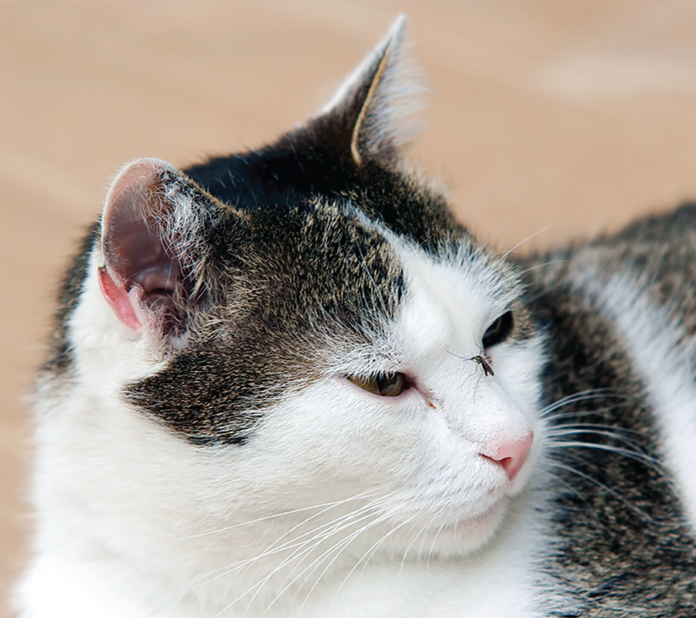Between 12% and 25% of indoor cats can harbor heartworm (Dirofilaria immitis), depending upon locale, says the American Heartworm Society. Heartworm infection, well-known in dogs, can damage the host animal’s heart, lungs, and blood vessels. The pulmonary arteries are a primary target for adult worms (these carry blood to the lungs to be oxygenated).
Cats are more resistant to heartworms than dogs, as they are not the natural host for this parasite; and the number of worms seen in feline infections is usually much lower than that seen in canine infections. These worms, however, can cause serious inflammatory reactions in the blood vessels and other tissue in the lungs, a grouping known as “heartworm associated respiratory disease (HARD).” HARD can be difficult to distinguish from other lung ailments, like asthma.
There are no approved treatments for heartworm in cats. The medication for dogs is toxic to cats. Your best defense is prevention (see sidebar).
Those Darn Mosquitoes
Heartworm disease is spread by a mosquito after it has bitten an infected animal such as a dog (infected cats are considered a dead-end host, unlikely to spread the infection). When the infected mosquito bites its next victim, it transfers the parasite.
“Between 60 and 100 days after the initial infection,” says Dwight Bowman, PhD, professor of parasitology at Cornell University’s College of Veterinary Medicine, “you can start to see signs of pathology in an affected animal’s body, even though the parasite has not yet reached maturity.”
The most common clinical signs of heartworm infection (see sidebar) may be confused with feline asthma or another bronchial disease. In some cases, a cat may survive a heartworm infection for an extended period of time before succumbing to another feline disorder. In an acute case of heartworm disease, a cat may die suddenly.
Some infected cats may collapse, seize, or die suddenly. If a cat has adult heartworms (often as few as three to six of them), secondary complications may occur when the heartworm dies (they usually live 2 to 4 years in cats). Toxin release from the dead heartworm and the resulting severe inflammatory flareups, along with possible clot formation, can lead to acute death of the cat.
Screening Tests
The best heartworm screening blood tests in cats are those that measure antibodies produced by the cat against the worm. The antigen test that is commonly used in dogs detects only adult female heartworms, and since feline heartworm infections tend to have more male heartworms, antigen testing may return false-negative results in cats. An antibody test may be positive from a current or past infection.
A positive screening test will be followed by a full physical examination, a complete blood panel, and chest radiographs. Depending upon the results, your veterinarian may suggest an echocardiogram to look for evidence of adult worms in the heart.
Treatment
If your cat is infected, treatment is primarily supportive care. Corticosteroids such as prednisone can reduce inflammation. Bronchodilators may help cats in respiratory distress. Cats in acute distress will require hospitalization and supplemental oxygen. Even in the event of spontaneous resolution of the heartworms, residual damage to the lungs often remains.
If your cat is not showing symptoms and is diagnosed with heartworm disease on a screening test, the American Heartworm Society suggests waiting out the adult worm’s two- to three-year life span with chest radiographs and a veterinary examination every six months.
Bottom Line
Don’t assume your indoor cat is safe from mosquito exposure. All cats need year-round protection against heartworm disease. Selamectin, milbemycin, or ivermectin are all good options for prevention. Some heartworm preventives will also fight other parasites, like fleas.Discuss options with your veterinarian.
What You Can Do
- Mininimize mosquito exposure with repellents.
- Consider planting basil, catnip,lavender, lemon balm peppermint, or rosemary in containers near doors and windows to deter mosquitoes.
- Using a good preventive medication such as selamectin, milbemycin, or ivermectin is a necessity.
- Start kittens on a heartworm preventive as early as the product label allows, no later than 8 weeks
of age.
Signs of Heartworm Disease
- Coughing
- Gagging
- Lethargy
- Loss of appetite/weight loss
- Rapid, labored breathing/wheezing
- Vomiting




